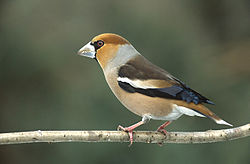Hawfinches in Britain: Difference between revisions
merge? |
|||
| Line 1: | Line 1: | ||
{{mergeto|Hawfinch}} |
|||
[[Image:Coccothraustes coccothraustes 1 (Marek Szczepanek).jpg|thumb|250px|A Hawfinch]]__NOTOC__ |
[[Image:Coccothraustes coccothraustes 1 (Marek Szczepanek).jpg|thumb|250px|A Hawfinch]]__NOTOC__ |
||
The '''[[Hawfinch]]''' (''Coccothraustes coccothraustes'') is a species of [[finch]] with a limited, fairly scarce breeding distribution in [[Great Britain]]. It is more abundant further south and east in [[Europe]] and [[Asia]]. |
The '''[[Hawfinch]]''' (''Coccothraustes coccothraustes'') is a species of [[finch]] with a limited, fairly scarce breeding distribution in [[Great Britain]]. It is more abundant further south and east in [[Europe]] and [[Asia]]. |
||
Revision as of 16:02, 18 March 2010

The Hawfinch (Coccothraustes coccothraustes) is a species of finch with a limited, fairly scarce breeding distribution in Great Britain. It is more abundant further south and east in Europe and Asia.
Status summary
In the 18th century, the Hawfinch was recorded as only a rare winter visitor in Britain. The first breeding record was early in the 19th century; by the early 1830s, a well-documented colony was established at Epping Forest in Essex, and breeding was also recorded in other counties east and south of London. Further expansion of the range continued through the 19th and 20th centuries, with breeding occurring as far north as Aberdeenshire by 1968–1972. Peak numbers were in the period 1983–1990. Subsequently, there has been a significant decline of between 37% and 45% between 1990–1999.[1][2][3][4]
Region by region
Southeast England
Southeast England is the stronghold of Hawfinch in Britain. One well-known site is Bedgebury Pinetum, where flocks gather to roost in winter. The species is also found in the New Forest; a central roost site exists here, at the Blackwater Arboretum.
Southwest England
In Devon, Hawfinch is largely confined to the upper Teign Valley.
Western England and Wales
Two areas in which Hawfinch reliably occurs are the Forest of Dean and the Wyre Forest.
Eastern England
Hawfinch is present in the Breckland of East Anglia.
Northern England
Hawfinches are regularly found in a small number of locations in northern England. Prime sites include Fountains Abbey in Yorkshire and Hulne Park in Northumberland. Hawfinches can be seen at Cromford Derbyshire near the canal
Scotland
Scone Palace near Perth is the most well-known site in Scotland for Hawfinch. Formerly, they also occurred in the Royal Botanic Garden Edinburgh.
Status as a Migrant
This section needs expansion. You can help by adding to it. (June 2008) |
References
- ^ Holloway, S. (1996). The Historical Atlas of Breeding Birds in Britain and Ireland: 1875–1900. T & A D Poyser ISBN 0-85661-094-1.
- ^ Sharrock, J. T. R. (1976). The Atlas of Breeding Birds in Britain and Ireland. British Trust for Ornithology / Irish Wildbird Conservancy ISBN 0-903793-01-6.
- ^ Gibbons, D. W., Reid, J. B., & Chapman, R. A., eds. (1993). The New Atlas of Breeding Birds in Britain and Ireland: 1988–1991. T & A D Poyser ISBN 0-85661-075-5.
- ^ Langston, R. H. W., Gregory, R. D., & Adams, R. (2002). The status of the Hawfinch in the UK 1975-1999. British Birds 95: 166-173.
